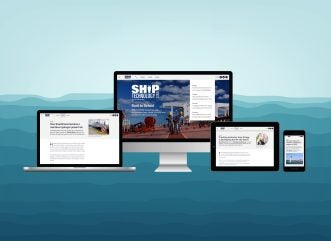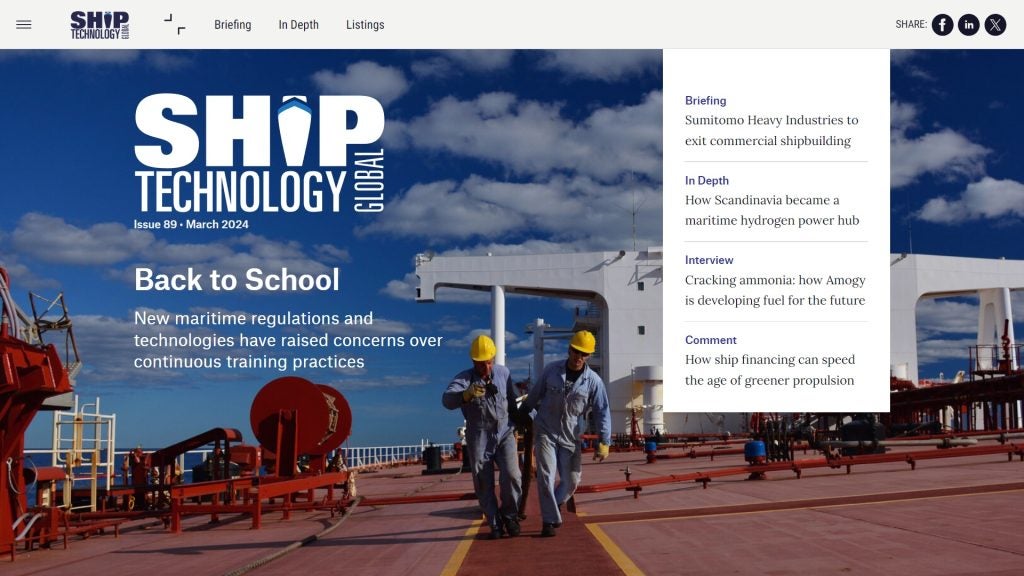
The new issue of Ship Technology Global magazine is out now!
The results of a survey of seafarers last year highlight that the majority believe that more training is needed to deal with the new technologies emerging in the maritime sector. In this issue, we take a look into the skills they need to learn, and how the industry will roll out the training.
Whether you are on a desktop, tablet or smartphone, you can read the magazine for free online.
Elsewhere, we look into some new propulsion technologies, including new wave devouring propulsion technology being researched at Cranfield University, how Amogy is pushing ammonia fuel into the future, and why Scandinavia has become a hub for hydrogen power.
As well as this, we give a rundown of the most expensive maritime projects last year and consider what the data tells us about the Red Sea crisis’ impact on maritime emissions.
For all this and the latest maritime industry news, comment, and analysis from GlobalData, read on. And don’t forget to stay up to date with everything at @ShipTechMag.

US Tariffs are shifting - will you react or anticipate?
Don’t let policy changes catch you off guard. Stay proactive with real-time data and expert analysis.
By GlobalDataPeter Nilson, editor

In this issue of Ship Technology Global
Training grounds: keeping seafarers up to date
A 2023 report noted that over 80% of seafarers believe they need more training to deal with new technologies arriving in the maritime sector. Keri Allan explores what they need to know and the best way to teach them.
Eating up the ocean: wave devouring propulsion
A new form of wave devouring propulsion could power ships while helping to cut greenhouse gas emissions in the maritime industry. Keri Allan investigates.
Cracking ammonia: how Amogy is developing fuel for the future
Noah Bovenizer talks to Anastasija Kuprijanova, Amogy’s director of maritime business development, about the use of ammonia as an alternative maritime fuel.
Top 10 most expensive maritime construction projects in 2023
89 major maritime construction projects broke ground in 2023 at a total cost of roughly $61.6bn. Peter Nilson highlights the ten most expensive projects.
How Scandinavia became a maritime hydrogen power hub
Hydrogen power has been mooted as a component of maritime decarbonisation. Patrick Atack explores how Northern Europe has become a hub for its development.
The Red Sea crisis could quadruple CO2 emissions from ships
Ships diverting away from the Red Sea puts a global goal to reduce shipping emissions by at least 20% by 2030 at risk. Polly Bindman investigates.
How ship financing can speed the age of greener propulsion
Elodie Tarby, strategic and capital advisory VP, and Paul Taylor, maritime industries global head at Societe Generale, highlight the progress in green shipping financing.
Next issue preview
In the June issue of Ship Technology Global, we take a look at ammonia fuel, and why the Scandinavian region is such a hotbed for the newest breakthroughs in the field.
We also take a look at the latest shipbuilding developments, and why the new IMO regulations will shape the designs of the vessels of the future.
In the meantime, you can stay up to date with everything at @ShipTechMag.
Would you like to be notified when a new issue of Ship Technology Global is out? Sign up for email alerts here!
We will only use your email address to let you know when a new issue is available. Ship Technology Global is published quarterly.



